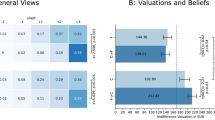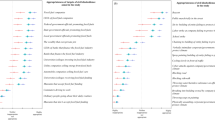Abstract
Domestic political processes shape climate policy. In particular, there is increasing concern about the role of political lobbying over climate policy. This paper examines how lobbying spending on the Waxman–Markey bill, the most prominent and promising United States climate regulation so far, altered its likelihood of being implemented. We combine data from comprehensive United States lobbying records with an empirical method for forecasting the policy’s effect on the value of publicly listed firms. Our statistical analysis suggests that lobbying by firms expecting losses from the policy was more effective than lobbying by firms expecting gains. Interpreting this finding through a game-theoretic model, we calculate that lobbying lowered the probability of enacting the Waxman–Markey bill by 13 percentage points, representing an expected social cost of US$60 billion (in 2018 US dollars). Our findings also suggest how future climate policy proposals can be designed to be more robust to political opposition.
This is a preview of subscription content, access via your institution
Access options
Access Nature and 54 other Nature Portfolio journals
Get Nature+, our best-value online-access subscription
$29.99 / 30 days
cancel any time
Subscribe to this journal
Receive 12 print issues and online access
$209.00 per year
only $17.42 per issue
Buy this article
- Purchase on Springer Link
- Instant access to full article PDF
Prices may be subject to local taxes which are calculated during checkout





Similar content being viewed by others
Data availability
The authors declare that all data and code for replicating the findings of this study are available at Dryad Digital Repository: https://doi.org/10.5061/dryad.gg4pk7d
References
Stern, N. Stern Review: The Economics of Climate Change (Cambridge Univ. Press, 2006).
Nordhaus, W. D. A Question of Balance: Weighing the Options on Global Warming Policies (Yale Univ. Press, 2008).
Social Cost of Carbon for Regulatory Impact Analysis Under Executive Order 12866 (Interagency Working Group on Social Cost of Carbon, US Government, 2010).
Nordhaus, W. Estimates of the social cost of carbon: concepts and results from the dice-2013r model and alternative approaches. J. Assoc. Environ. Resour. Econ. 1, 273–312 (2014).
Meng, K. C. Using a free permit rule to forecast the marginal abatement cost of proposed climate policy. Am. Econ. Rev. 107, 748–784 (2017).
Barrett, S. Environment and Statecraft: The Strategy of Environmental Treaty-making (Oxford Univ. Press, 2003).
Victor, D. G. Global Warming Gridlock: Creating More Effective Strategies for Protecting the Planet (Cambridge Univ. Press, 2011).
Becker, G. S. A theory of competition among pressure groups for political influence. Q. J. Econ. 98, 371–400 (1983).
Austen-Smith, D. & Wright, J. R. Counteractive lobbying. Am. J. Pol. Sci. 38, 25–44 (1994).
Grossman, G. M. & Helpman, E. Protection for sale. Am. Econ. Rev. 84, 833–850 (1994).
Grossman, G. M. & Helpman, E. The politics of free-trade agreements. Am. Econ. Rev. 85, 667–690 (1995).
Persson, T. Economic policy and special interest politics. Econ. J. 108, 310–327 (1998).
Hall, R. L. & Deardorff, A. V. Lobbying as legislative subsidy. Am. Polit. Sci. Rev. 100, 69–84 (2006).
Baumgartner, F. R., Berry, J. M., Hojnacki, M., Leech, B. L. & Kimball, D. C. Lobbying and Policy Change: Who Wins, Who Loses, and Why (Univ. of Chicago Press, 2009).
Kim, S. E., Urpelainen, J. & Yang, J. Electric utilities and american climate policy: lobbying by expected winners and losers. J. Public Policy 36, 251–275 (2016).
Delmas, M., Lim, J. & Nairn-Birch, N. Corporate environmental performance and lobbying. Acad. Manag. Discov. 2, 175–197 (2016).
Grumbach, J. M. Polluting industries as climate protagonists: cap and trade and the problem of business preferences. Bus. Polit. 17, 633–659 (2015).
Brulle, R. J. The climate lobby: a sectoral analysis of lobbying spending on climate change in the USA, 2000 to 2016. Clim. Change 149, 289–303 (2018).
Lavelle, M. An army of lobbyists readies for battle on the climate bill. Yale Environment 360 https://e360.yale.edu/features/an_army_of_lobbyists_readies_for_battle_on_the_climate_bill (2009).
Mulkern, A. C. Lobbying cash paved climate bill’s road to house floor. The New York Times (26 June 2009).
Samuel, T. How prospects cooled for U.S. global warming bill. National Geographic News (1 August 2010).
Downie, C. Business actors, political resistance, and strategies for policymakers. Energy Policy 108, 583–592 (2017).
Bank, W. Carbon Pricing Watch 2017 (World Bank, Ecofys., 2017).
Snowberg, E., Wolfers, J. & Zitzewitz, E. Partisan impacts on the economy: evidence from prediction markets and close elections. Q. J. Econ. 122, 807–829 (2007).
Wolfers, J. & Zitzewitz, E. Interpreting Prediction Market Prices as Probabilities Working Paper 12200 (National Bureau of Economic Research, 2006).
Kang, K. Policy influence and private returns from lobbying in the energy sector. Rev. Econ. Stud. 83, 269–305 (2016).
Tullock, G. in Toward a Theory of the Rent-seeking Society (eds Buchanan, J. M., Tollison, R. D. & Tullock, G.) Ch. 6 (Texas A&M Univ. Press, 1980).
Hirshleifer, J. Conflict and rent-seeking success functions: ratio vs. difference models of relative success. Public Choice 63, 101–112 (1989).
Congleton, R. D., Hillman, A. L. & Konrad, K. A. (eds) Forty Years of Research on Rent Seeking:1 Theory of Rent Seeking 1–42 (Springer-Verlag, 2008).
Montgomery, W. D. Markets in licenses and efficient pollution control programs. J. Econ. Theory 5, 395–418 (1972).
Holladay, J. & Schwartz, J. The Other Side of the Coin: The Economic Benefits of Climate Legislation (Institute for Policy Integrity, 2009).
Hurley, T. M. Rent dissipation and efficiency in a contest with asymmetric valuations. Public Choice 94, 289–298 (1998).
Hahn, R. W. & Stavins, R. N. The Effect of Allowance Allocations on Cap-and-Trade System Performance Working Paper 15854 (National Bureau of Economic Research, 2010).
Fowlie, M. & Perloff, J. M. Distributing pollution rights in cap-and-trade programs: are outcomes independent of allocation?. Rev. Econ. Stat. 95, 1640–1652 (2013).
Bovenberg, A. L. & Goulder, L. H. Behavioral and Distributional Effects of Environmental Policy 45–90 (National Bureau of Economic Research, 2001).
Cheon, A. & Urpelainen, J. How do competing interest groups influence environmental policy? The case of renewable electricity in industrialized democracies, 1989–2007. Polit. Stud. 61, 874–897 (2013).
Gullberg, A. T. Lobbying friends and foes in climate policy: the case of business and environmental interest groups in the european union. Energy Policy 36, 2964–2972 (2008).
Gullberg, A. T. Rational lobbying and EU climate policy. Int. Environ. Agreem. 8, 161–178 (2008).
Olson, M. Logic of Collective Action: Public Goods and the Theory of Groups (Harvard Univ. Press, 1965).
Bernhagen, P. Business and international environmental agreements: domestic sources of participation and compliance by advanced industrialized democracies. Glob. Environ. Polit. 8, 78–110 (2008).
Skocpol, T. Naming the problem: what it will take to counter extremism and engage Americans in the fight against global warming (Harvard Univ., 2013).
Kamieniecki, S. Corporate America and Environmental Policy: How Often Does Business Get Its Way? (Stanford Univ. Press, 2006).
Layzer, J. A. Open for business: Conservatives’ Opposition to Environmental Regulation (MIT Press, 2012).
Jianqing, F. & Gijbels, I. Local Polynomial Modelling and its Applications. Monographs on Statistics and Applied Probability (Chapman & Hall/CRC, 1996).
Snowberg, E., Wolfers, J. & Zitzewitz, E. How prediction markets can save event studies Working Paper 16949 (National Bureau of Economic Research, 2011).
Browning, M., Bourguignon, F., Chiappori, P.-A. & Lechene, V. Income and outcomes: a structural model of intrahousehold allocation. J. Pol. Econ. 102, 1067–1096 (1994).
Hahn, R. W. & Stavins, R. N. The effect of allowance allocations on cap-and-trade system performance. J. Law Econ. 54, 267–294 (2011).
Acknowledgements
We thank S. Anderson, C. Costello, B. Deacon, R. Gerlagh, M. Greenstone, S. Hsiang, M. Mildenberger, P. Oliva, M. Vespa, S. Yuksel, and participants in numerous workshops and seminars, for their helpful comments.
Author information
Authors and Affiliations
Contributions
K.C.M. and A.R. designed the study, collected the data, performed the analysis and wrote the paper.
Corresponding authors
Ethics declarations
Competing interests
The authors declare no competing interests.
Additional information
Peer review information: Nature Climate Change thanks Robert Brulle, Andrew Cheon, Fabien Prieur and Jason Shogren for their contribution to the peer review of this work.
Publisher’s note: Springer Nature remains neutral with regard to jurisdictional claims in published maps and institutional affiliations.
Supplementary information
Supplementary Information
Supplementary Notes, Supplementary Figures 1–2 and Supplementary Tables 1–7.
Rights and permissions
About this article
Cite this article
Meng, K.C., Rode, A. The social cost of lobbying over climate policy. Nat. Clim. Chang. 9, 472–476 (2019). https://doi.org/10.1038/s41558-019-0489-6
Received:
Accepted:
Published:
Issue Date:
DOI: https://doi.org/10.1038/s41558-019-0489-6
This article is cited by
-
Lobbying, Time Preferences and Emission Tax Policy
Economics of Disasters and Climate Change (2023)
-
Advancing bipartisan decarbonization policies: lessons from state-level successes and failures
Climatic Change (2022)
-
The role of high-socioeconomic-status people in locking in or rapidly reducing energy-driven greenhouse gas emissions
Nature Energy (2021)
-
Chancen und Risiken klimapolitischer Langfriststrategien am Beispiel des deutschen Klimaschutzgesetzes
Wirtschaftsdienst (2021)



